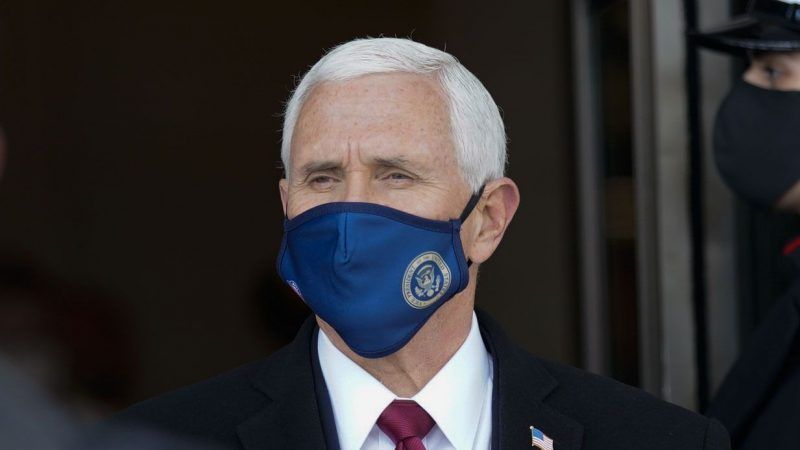Cancel Culture Comes for Will Wilkinson
The Niskanen Center fired a senior staffer for tweeting an offensive joke about Mike Pence, and hypocrisies abound.

Will Wilkinson is a vice president at the left-leaning Niskanen Center, a contributing writer at The New York Times, and someone who has frequently quarreled with me about so-called cancel culture. (I think it's generally bad when people are fired, expelled, or dragged on social media for saying stupid or poorly phrased things they quickly come to regret; Wilkinson has suggested to me that I've made too much of this problem.)
On Wednesday, Wilkinson tweeted, "If Biden really wanted unity, he'd lynch Mike Pence."
Lynching humor is virtually never a good idea, and this joke was especially badly executed. (Wilkinson said he was making a joke not at the former vice president's expense, but in reference to the Capitol rioters who had expressed a similar sentiment. The joke being that this time it was the far right calling for violence against a Republican official rather than the left.)
Nevertheless, widespread outrage—some of it stoked by conservative news sites like The Federalist and The Daily Caller—ensued on social media. Wilkinson apologized, describing his tweet as a lapse in judgment.
"It was sharp sarcasm, but looked like a call for violence," said Wilkinson. "That's always wrong, even as a joke."
Nevertheless, the Niskanen Center fired Wilkinson and made it clear that they did so explicitly because of the tweet. "The Niskanen Center appreciates and encourages interesting and provocative online discourse," wrote Niskanen President Jerry Taylor in a statement. "However we draw the line at statements that are, or can in any way be interpreted as, condoning or promoting violence."
The New York Times, too, may take action. "Advocating violence of any form, even in jest, is unacceptable and against the standards of The New York Times," a Times spokesperson told Fox News. "We're reassessing our relationship with Will Wilkinson."
And thus a noted doubter of cancel culture has been canceled for a problematic tweet—ironic, but also regrettable, in my view. Both the Niskanen Center and The New York Times are private organizations and free to associate with whomever they wish, of course; a think tank that intends to influence public policy by lobbying legislators may find it inconvenient to employ someone who threatened violence against Mike Pence, even in jest. And decisions about hiring and firing are rarely as simple as they appear to outside observers with an ax to grind, so there may well be more going on here—though the statement from Taylor seems to eliminate much of that ambiguity in this case.
The term cancel culture, in recent years, has metastasized and is now deployed in a wide variety of situations, some of which strain the boundaries of the term to breaking. Rep. Jim Jordan (R–Ohio), for instance, described the second impeachment of President Donald Trump for his role in the Capitol riots as an example of Democrats trying to "cancel" the president. This is nonsense.
But Wilkinson's case is a classic, textbook cancellation: excessively harsh, drastic disciplinary action in response to one dumb tweet that would otherwise likely have been forgotten in a matter of days.
This affair has produced several hypocrisies. First, if the Niskanen Center "draws the line at statements that are, or can in any way be interpreted as, condoning or promoting violence," then it would have to fire its president. Taylor has arguably used Twitter in a manner that suggests he condones violence. He rooted for antifa to punch out Mark and Patricia McCloskey, the St. Louis couple who waved their guns at protesters encountered on their private street. "If I were in that march, and these racist lunatics were waiving [sic] guns at me, I'd like to think I'd rush them and beat their brains in," said Taylor. "And I wouldn't apologize for it for one goddam [sic] second."
Unlike Wilkinson's tweet, there's little reason to assume this was meant in jest. And unlike Wilkinson, Taylor is the president of the organization and sets the tone for what is permissible. If the boss can tweet an unapologetic call to "beat their brains in," his employees might very well think that edgy humor is okay. Perhaps that's why Taylor deleted his statement regarding Wilkinson's firing—he realized that it impugned him as well. (Neither Taylor nor a spokesperson for the Niskanen Center responded to a request for comment. Wilkinson declined to comment.)
Another hypocrisy concerns the conservative news outlets that wrote about Wilkinson in the first place. Both The Federalist and The Daily Caller complain constantly about cancel culture, and favorably cover those who criticize it. They are often right to do so. (In fact, I have been quoted in The Federalist, The Daily Caller, and even a Niskanen Center report, about the perils of cancellation.) But when the time came to show the exact sort of mercy they otherwise would have called for had the subject been a victim of left-wing activists or the mainstream media, these elements of the right poured gasoline on this fire without any hesitation.
If you only criticize cancel culture when it's your side being canceled, then you aren't really attacking the concept—you're just playing defense for your team. That's why it's important to speak out on behalf of those facing social media mob justice, even when the victim is not a member of one's own ideological coalition.
Indeed, given that I am primarily known for criticizing cancel culture, Wilkinson—who once tweeted "Cancel culture, lol" and also suggested I branch out to "slightly more important stories"—may be the closest thing I have to an ideological foe. In that spirit, I oppose his firing, and encourage his employers to reconsider.
Show Comments (244)